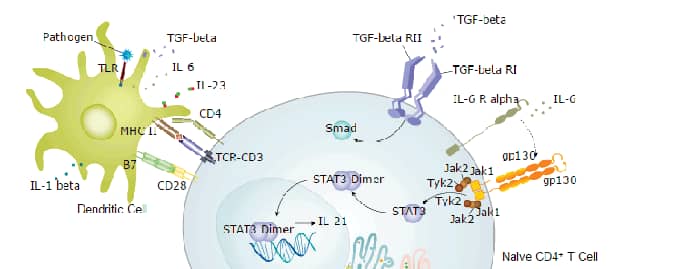Recombinant Canine IL-6 Protein Summary
Product Specifications
Thr23-Met207, with an N-terminal Met & Pro24-Met207
Analysis
Product Datasheets
Carrier Free
CF stands for Carrier Free (CF). We typically add Bovine Serum Albumin (BSA) as a carrier protein to our recombinant proteins. Adding a carrier protein enhances protein stability, increases shelf-life, and allows the recombinant protein to be stored at a more dilute concentration. The carrier free version does not contain BSA.
In general, we advise purchasing the recombinant protein with BSA for use in cell or tissue culture, or as an ELISA standard. In contrast, the carrier free protein is recommended for applications, in which the presence of BSA could interfere.
1609-CL
| Formulation | Lyophilized from a 0.2 μm filtered solution in PBS with BSA as a carrier protein. |
| Reconstitution | Reconstitute at 100 μg/mL in sterile PBS containing at least 0.1% human or bovine serum albumin. |
| Shipping | The product is shipped at ambient temperature. Upon receipt, store it immediately at the temperature recommended below. |
| Stability & Storage: | Use a manual defrost freezer and avoid repeated freeze-thaw cycles.
|
1609-CL/CF
| Formulation | Lyophilized from a 0.2 μm filtered solution in PBS. |
| Reconstitution | Reconstitute at 100 μg/mL in sterile PBS. |
| Shipping | The product is shipped at ambient temperature. Upon receipt, store it immediately at the temperature recommended below. |
| Stability & Storage: | Use a manual defrost freezer and avoid repeated freeze-thaw cycles.
|
Reconstitution Calculator
Background: IL-6
Interleukin-6 (IL-6) is a pleiotropic, alpha -helical, 22-28 kDa phosphorylated and variably glycosylated cytokine that plays important roles in the acute phase reaction, inflammation, hematopoiesis, bone metabolism, and cancer progression (1-5). Mature canine IL-6 is 187 amino acids (aa) in length and shares 58%, 37%, 39%, and 76% aa sequence identity with human, mouse, rat, and feline IL-6, respectively IL-6. IL-6 induces signaling through a cell surface heterodimeric receptor complex composed of a ligand binding subunit (IL-6 R alpha) and a signal transducing subunit (gp130). IL-6 binds to IL-6 R alpha, triggering IL-6 R alpha association with gp130 and gp130 dimerization (6). gp130 is also a component of the receptors for CLC, CNTF, CT-1, IL-11, IL-27, LIF, and OSM (7). Soluble forms of IL-6 R alpha are generated by both alternative splicing and proteolytic cleavage (5). In a mechanism known as trans-signaling, complexes of soluble IL-6 and IL-6 R alpha elicit responses from gp130-expressing cells that lack cell surface IL-6 R alpha (5). Trans-signaling enables a wider range of cell types to respond to IL-6, as the expression of gp130 is ubiquitous, while that of IL-6 R alpha is predominantly restricted to hepatocytes, monocytes, and resting lymphocytes (2, 5). Soluble splice forms of gp130 block trans-signaling from IL-6/IL-6 R alpha but not from other cytokines that use gp130 as a co-receptor (5, 8). IL-6, along with TNF-alpha and IL-1, drives the acute inflammatory response and the transition from acute inflammation to either acquired immunity or chronic inflammatory disease (1-5). When dysregulated, it contributes to chronic inflammation in obesity, insulin resistance, inflammatory bowel disease, arthritis, sepsis, and atherosclerosis (1, 2, 5). IL-6 can also function as an anti-inflammatory molecule, as in skeletal muscle where it is secreted in response to exercise (2). In addition, it enhances hematopoietic stem cell proliferation and the differentiation of Th17 cells, memory B cells, and plasma cells (1, 9).
- Mansell, A. and B.J. Jenkins (2013) Cytokine Growth Factor Rev. 24:249.
- Schuett, H. et al. (2009) Thromb. Haemost. 102:215.
- Erta, M. et al. (2012) Int. J. Biol. Sci. 8:1254.
- Garbers, C. et al. (2012) Cytokine Growth Factor Rev. 23:85.
- Mihara, M. et al. (2012) Clin. Sci. (Lond.) 122:143.
- Murakami, M. et al. (1993) Science 260:1808.
- Muller-Newen, G. (2003) Sci. STKE 2003:PE40.
- Mitsuyama, K. et al. (2006) Clin. Exp. Immunol. 143:125.
- Cerutti, A. et al. (1998) J. Immunol. 160:2145.
Citations for Recombinant Canine IL-6 Protein
R&D Systems personnel manually curate a database that contains references using R&D Systems products. The data collected includes not only links to publications in PubMed, but also provides information about sample types, species, and experimental conditions.
4
Citations: Showing 1 - 4
Filter your results:
Filter by:
-
Immortalised canine buccal epithelial cells' CXCL8 secretion is affected by allergen extracts, Toll-like receptor ligands, IL-17A and calcitriol
Authors: M Pelst, C Höbart, H de Rooster, B Devriendt, E Cox
Veterinary research, 2022-09-13;53(1):72.
Species: Canine
Sample Types: Whole Cells
Applications: Bioassay -
Dendritic cell vaccination plus low-dose doxorubicin for the treatment of spontaneous canine hemangiosarcoma
Authors: V Konduri, MM Halpert, YC Baig, R Coronado, JR Rodgers, JM Levitt, B Cerroni, S Piscoya, N Wilson, L DiBernardi, Z Omarbekov, L Seelhoff, V Ravi, L Douglass, WK Decker
Cancer Gene Ther., 2019-01-23;0(0):.
Species: Canine
Sample Types: Whole Cells
Applications: Bioassay -
Treatment of canine leukocyte adhesion deficiency by foamy virus vectors expressing CD18 from a PGK promoter.
Authors: Bauer TR, Olson EM, Huo Y
Gene Ther., 2011-01-13;18(6):553-9.
Species: Canine
Sample Types: Whole Cells
Applications: Bioassay -
Autocrine effects of interleukin-6 mediate acute-phase proinflammatory and tissue-reparative transcriptional responses of canine bladder mucosa.
Authors: Wood MW, Breitschwerdt EB, Gookin JL
Infect. Immun., 2010-11-29;79(2):708-15.
Species: Canine
Sample Types: Whole Cells
Applications: Bioassay
FAQs
No product specific FAQs exist for this product, however you may
View all Proteins and Enzyme FAQsReviews for Recombinant Canine IL-6 Protein
There are currently no reviews for this product. Be the first to review Recombinant Canine IL-6 Protein and earn rewards!
Have you used Recombinant Canine IL-6 Protein?
Submit a review and receive an Amazon gift card.
$25/€18/£15/$25CAN/¥75 Yuan/¥2500 Yen for a review with an image
$10/€7/£6/$10 CAD/¥70 Yuan/¥1110 Yen for a review without an image












